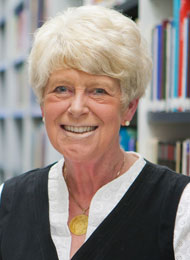The programs of study social sciences as a means of uncovering injustices in society
Margaret Archer, Master's Degree professor at research in Social Sciences, recalled on the World Day of Social Justice some challenges such as immigration or labor exploitation.

PHOTO: Manuel Castells
The Humanities and social sciences can bring valuable knowledge to society for awareness and social change. This is the belief of Margaret Archer, Professor of Sociology at the University of Warwick, who recently visited the University of Navarra to teach class in the Master's Degree at research in Social Sciences. For her, research in these areas can demonstrate the existence of social problems and bring them to the public sphere for discussion, such as the harshness of working conditions in some factories or immigration.
On the occasion of the World Day of Social Justice, he stressed the importance of research on the development of the Economics and social dialogue to achieve social justice, although he also warns that they can become a double-edged sword. For example, social security was a legal measure imposed and allowed everyone to have health attendance . Then, he highlights the movement of the yellow vests, which revolted the French population against the increase in fuel taxes. "For the poor, if they had the luxury of owning a car, these taxes represented a large part of their income," he explains.
On the other hand, she regrets that no progress has been made in social dialogue for coexistence either. "The dialogue on women's equality has done a great deal in the last thirty years, but it is still an unfinished business," she clarifies.
The injustice of immigrationAn even more stagnant dialogue that, for the expert, should be made visible is that of race and immigration. The sociologist believes that there is still a certain rejection by the families of class average of people of color. In places like Holland or Italy, political parties are developing that are not exactly friendly to people of other races.
In addition, he assures that in the United Kingdom, his native country, the burden of financial aid to immigrants and refugees falls on volunteers, since the State does not take responsibility and considers them "a burden". Archer founded a association that rescues victims of human trafficking and has experienced it firsthand: "When a victim of trafficking is discovered and reported to the police, they have no right to stay or work, how are they supposed to survive then?" she laments.
However, in the face of today's massive migratory movements, Archer considers that the work of volunteers is not enough and large-scale actions are needed. The expert affirms that it is necessary to create a financing fund where all the countries of the European Union contribute something and, thus, it would be avoided that some countries, such as Greece, would be overwhelmed and without resources in the face of the arrival of refugees. "If the European Union considers itself a defender of justice, it must defend it for all, despite the possible drawbacks," he concludes.
Margaret S. Archer (UK, 1943) is Professor of Sociology at the University of Warwick, and a founding member and current president of the Pontifical Academy of Social Sciences. She was also the first woman president of association International Sociology. She received her BA and PhD in Sociology from the London School of Economics, University of London, and programs of study from postgraduate program at the Sorbonne University. She has taught at the Universities of Cambridge, London School of Economics, University of Reading and University of Warwick. In June 2019 she will receive the doctorate Honoris Causa from the University of Navarra.
